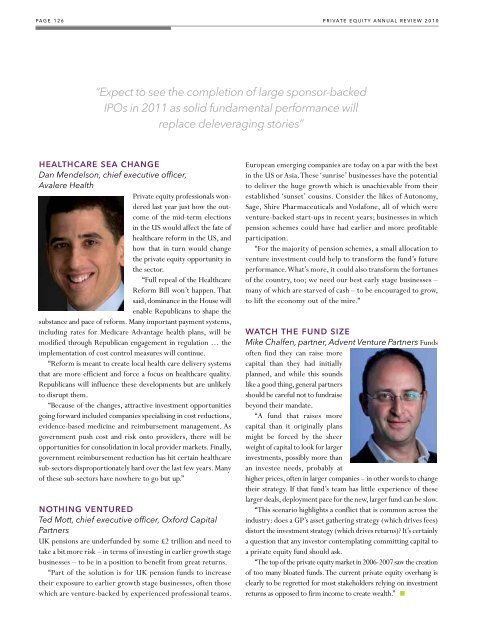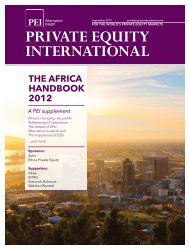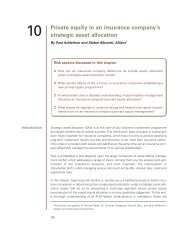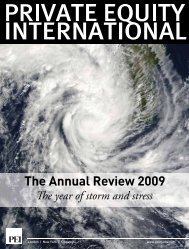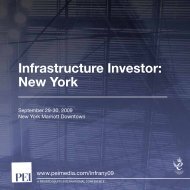THE ANNUAL REVIEW 2010 - PEI Media
THE ANNUAL REVIEW 2010 - PEI Media
THE ANNUAL REVIEW 2010 - PEI Media
Create successful ePaper yourself
Turn your PDF publications into a flip-book with our unique Google optimized e-Paper software.
page 126 private equity annual review <strong>2010</strong><br />
“Expect to see the completion of large sponsor-backed<br />
IPOs in 2011 as solid fundamental performance will<br />
replace deleveraging stories”<br />
healthcare sea change<br />
Dan Mendelson, chief executive officer,<br />
Avalere Health<br />
Private equity professionals wondered<br />
last year just how the outcome<br />
of the mid-term elections<br />
in the US would affect the fate of<br />
healthcare reform in the US, and<br />
how that in turn would change<br />
the private equity opportunity in<br />
the sector.<br />
“Full repeal of the Healthcare<br />
Reform Bill won’t happen. That<br />
said, dominance in the House will<br />
enable Republicans to shape the<br />
substance and pace of reform. Many important payment systems,<br />
including rates for Medicare Advantage health plans, will be<br />
modified through Republican engagement in regulation … the<br />
implementation of cost control measures will continue.<br />
“Reform is meant to create local health care delivery systems<br />
that are more efficient and force a focus on healthcare quality.<br />
Republicans will influence these developments but are unlikely<br />
to disrupt them.<br />
“Because of the changes, attractive investment opportunities<br />
going forward included companies specialising in cost reductions,<br />
evidence-based medicine and reimbursement management. As<br />
government push cost and risk onto providers, there will be<br />
opportunities for consolidation in local provider markets. Finally,<br />
government reimbursement reduction has hit certain healthcare<br />
sub-sectors disproportionately hard over the last few years. Many<br />
of these sub-sectors have nowhere to go but up.”<br />
nothing ventured<br />
Ted Mott, chief executive officer, Oxford Capital<br />
Partners<br />
UK pensions are underfunded by some £2 trillion and need to<br />
take a bit more risk – in terms of investing in earlier growth stage<br />
businesses – to be in a position to benefit from great returns.<br />
“Part of the solution is for UK pension funds to increase<br />
their exposure to earlier growth stage businesses, often those<br />
which are venture-backed by experienced professional teams.<br />
European emerging companies are today on a par with the best<br />
in the US or Asia. These ‘sunrise’ businesses have the potential<br />
to deliver the huge growth which is unachievable from their<br />
established ‘sunset’ cousins. Consider the likes of Autonomy,<br />
Sage, Shire Pharmaceuticals and Vodafone, all of which were<br />
venture-backed start-ups in recent years; businesses in which<br />
pension schemes could have had earlier and more profitable<br />
participation.<br />
“For the majority of pension schemes, a small allocation to<br />
venture investment could help to transform the fund’s future<br />
performance. What’s more, it could also transform the fortunes<br />
of the country, too; we need our best early stage businesses –<br />
many of which are starved of cash – to be encouraged to grow,<br />
to lift the economy out of the mire.”<br />
watch the fund size<br />
Mike Chalfen, partner, Advent Venture Partners Funds<br />
often find they can raise more<br />
capital than they had initially<br />
planned, and while this sounds<br />
like a good thing, general partners<br />
should be careful not to fundraise<br />
beyond their mandate.<br />
“A fund that raises more<br />
capital than it originally plans<br />
might be forced by the sheer<br />
weight of capital to look for larger<br />
investments, possibly more than<br />
an investee needs, probably at<br />
higher prices, often in larger companies – in other words to change<br />
their strategy. If that fund’s team has little experience of these<br />
larger deals, deployment pace for the new, larger fund can be slow.<br />
“This scenario highlights a conflict that is common across the<br />
industry: does a GP’s asset gathering strategy (which drives fees)<br />
distort the investment strategy (which drives returns)? It’s certainly<br />
a question that any investor contemplating committing capital to<br />
a private equity fund should ask.<br />
“The top of the private equity market in 2006-2007 saw the creation<br />
of too many bloated funds. The current private equity overhang is<br />
clearly to be regretted for most stakeholders relying on investment<br />
returns as opposed to firm income to create wealth.” n


